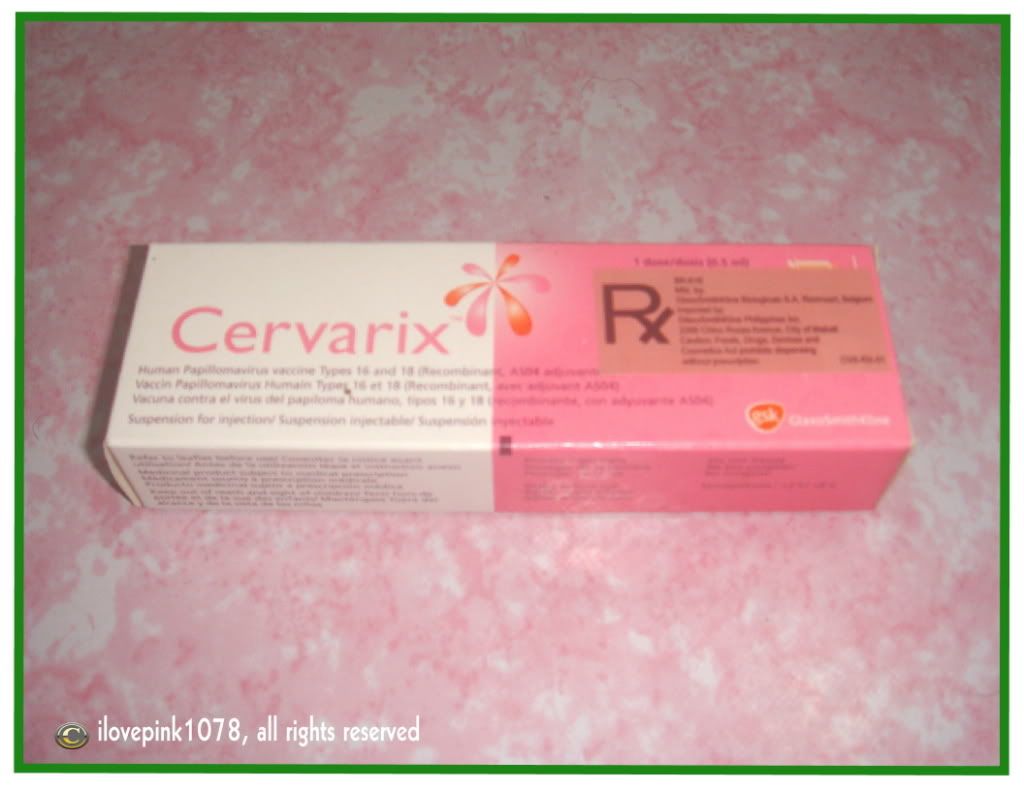Last week, I just had my second dose of cervarix vaccine (cervival cencer vaccine). I am grateful because I almost done and to complete my three series of injection in six months period. The primary vaccination course for cervical cancer vaccine consists of three doses, given at 0, 1 and 6 months. Studies shows, that cervical cancer vaccine can prevent most cases of cervical cancer if given before a girl or woman is exposed to the virus.
Information about cervical cancer
Source: Mayo Clinic
What causes cervical cancer?
According to Dr. Bobbie Gostout, M.D., an HPV infection expert and gynecologic surgeon at Mayo Clinic, Rochester, Minn., discusses cervical cancer. Most cervical cancers are caused by the sexually transmitted infection human papillomavirus (HPV).
What does the cervical cancer vaccine do?
Various strains of HPV, which spread through sexual contact, cause most cases of cervical cancer. Two cervical cancer vaccines have Food and Drug Administration (FDA) approval in the U.S. — Gardasil and Cervarix. Both vaccines can prevent most cases of cervical cancer if given before a girl or woman is exposed to the virus.
In addition, both can prevent vaginal and vulvar cancer in women and Gardasil can prevent genital warts in women and men.
Whom is the cervical cancer vaccine for and when should it be given?
The cervical cancer vaccine is recommended for girl’s ages 11 to 12, although it may be given to girls as young as age 9. It is important for girls to receive the vaccine before they have sexual contact and are exposed to HPV. Once a girl or woman has been infected with HPV, the vaccine may not be as effective.
In addition, Gardasil can be given to boys between ages 9 and 26 to help prevent genital warts.
The Centers for Disease Control and Prevention (CDC) recommends catch-up immunization for girls and women ages 13 to 26 who haven't received the vaccine or who haven't completed the full vaccine series. The cervical cancer vaccine is not recommended, however, for women older than age 26.
Both vaccines are given as a series of three injections over a six-month period. The second dose is given one to two months after the first dose, and the third dose is given six months after the first dose.
The cervical cancer vaccine is not recommended for pregnant women or people who are moderately or severely ill. Tell your doctor if you have any severe allergies, including an allergy to yeast or latex.
Why are three doses of the cervical cancer vaccine needed?
Researchers don't yet know what antibody levels provide adequate protection from HPV. In early clinical trials, researchers observed that women's antibody levels continued to increase with each of the three doses of the vaccine. Since antibody levels inevitably fall once you stop getting a vaccine, it makes sense to start with high antibody levels and attempt to get the greatest HPV protection for the longest possible time — years or even decades.
Over time, however, researchers may find that three doses of the vaccine aren't necessary — or that a booster shot is needed years later.
Does the cervical cancer vaccine offer benefits if you're already sexually active?
Yes. In clinical trials, Gardasil and Cervarix were effective in groups of sexually active women age 26 or younger, some of whom had already been infected with one or more types of HPV. However, Gardasil and Cervarix only protect you from specific strains of HPV to which you haven't been exposed. The more sexual partners you've had, the greater your chance of having been exposed to multiple types of HPV.
Thank you for reading and commenting...
main |
sidebar
This is a brief record of my day-to-day activity. Share thoughts, belief and things of interest in life.
Saturday, March 12, 2011
Subscribe to:
Post Comments (Atom)
About Me
Grab Me...
GC Followers
Flag Counter
Live Traffic
Labels
a new life
Activities
Adventure
Anime
Awards
Beauty and Health
Birthday
Carnaza Island
Cebu Beach
Celebration
Ceremony
Color Carnival
Contest
cosplay
covid-19
covid19
Day Use Promo
Dream Summer Vacation
Earth Hour
easter sunday
Enhanced Community Quarantine
Event
Events
Follow Me Tuesday
Food
Gadget
Greetings
GSP
GSP MVG
Guide for Vaccination
Guide to Getting Vaccinated
Happy Father's Day
Happy Mother's Day
Health
Hotel and Resort Reviews
Info.
International Women's Day
Island Hopping
Jota
Joti
life Style
Lyrics
Mellow Yellow Monday
Meme
Monochrome Weekend
Mothers Day Greetings
My Travel
My Travel Blog
News
Philippines
Photograhy
Pink Saturday
Pink's fab
Places
Prayers
Products
Program
remain faithful
resurrection
Ruby Tuesday
Services
Shadow Shot Sunday
Skywatch Friday
Songs and Yell
stay at home
Summer Getaway
Summer Vacation
Sunrise Floating Food Tray
TG
The Mark Resort
Tips
Todays Flower
Tourist Destination
Travel
Travel and Tour Itinerary
Travel Blog
Travel Vlog
Vaccination Process
Virtual Run
Vrtual Run
WAGGGS
Watery Wednesday
Winners
Wordless Wednesday
Disclosure
This policy is valid from 11 May 2010
This blog is a personal blog written and edited by me. This blog accepts forms of cash advertising, sponsorship, paid insertions or other forms of compensation.
The compensation received may influence the advertising content, topics or posts made in this blog. That content, advertising space or post may not always be identified as paid or sponsored content.
The owner(s) of this blog is compensated to provide opinion on products, services, websites and various other topics. Even though the owner(s) of this blog receives compensation for our posts or advertisements, we always give our honest opinions, findings, beliefs, or experiences on those topics or products. The views and opinions expressed on this blog are purely the bloggers' own. Any product claim, statistic, quote or other representation about a product or service should be verified with the manufacturer, provider or party in question.
This blog does not contain any content which might present a conflict of interest.
To get your own policy, go to http://www.disclosurepolicy.org
Template Design by SkinCorner |Grunged Girl Image from Dapino-Graphics











1 comments:
i'd really want to have one myself but i'm still saving up for it but i will inquire with my ob regarding the next time i visit, thanks for reminding sis^^
Post a Comment
Thank You So Much and More Power!
Like to visit my other sites:
Pink Go Green
MAPEH homepage